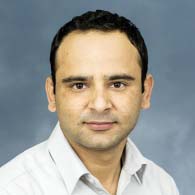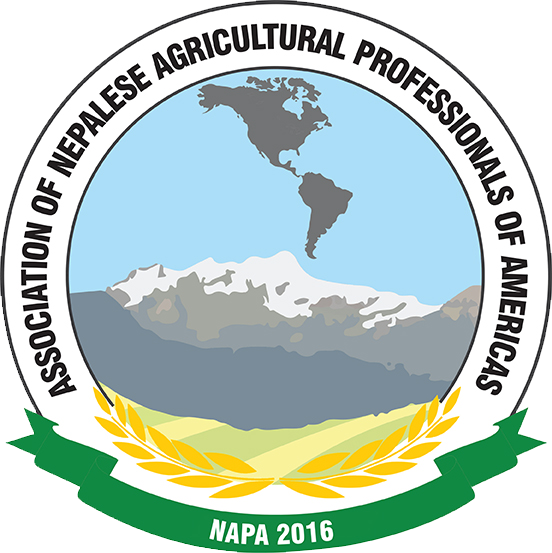| Association of Nepalese Agricultural Professionals of Americas (NAPA) |
IT Committee (2024-2026)
Chair
 Ananta Acharya, PhD
Ananta Acharya, PhD
Data Lead, Early Product Development, Inari Agriculture, West Lafayette, IN, USA
Email: ananta.acharya at gmail dot com
Dr. Acharya is data lead, Early Product Development for Inari Agriculture. He leads scientists and data analysts who specialize in solving complex genomics and bioinformatics data problems and move the gene edited plants through the product development and plant breeding. Before joining Inari, Ananta worked as a research scientist in Corteva Agriscience. Dr. Acharya's research interests are use of Bioinformatics and computational biology in Agriculture, esp. crop improvement. He has experience in working with plant breeding, genetics, genomics and computational biology while in academia and while working in the agriculture industry. He has published multiple peer-reviewed articles in the field of plant breeding, genomics and bioinformatics. Dr. Acharya was Joint Secretary of NAPA (2018-2020) and has served in various sub-committees since 2017. He is also managing editor of GJAAS.
Members
 Dev Paudel, PhD
Dev Paudel, PhD
Scientist II, Tome Biosciences
Email: dpaudel at outlook dot com
Dr. Dev Paudel is currently working as a Scientist II at Tome Biosciences. Previously, he was a Postdoctoral Research Associate in the Environmental Horticulture Department at the University of Florida - Gulf Coast Research and Education Center where he studied genomics of blackberry and citrus. Dr. Paudel received his Bachelor’s degree in Agriculture from the Institute of Agriculture and Animal Science in 2009. After completing undergraduate degree, he worked as Horticultural Development Officer at the Ministry of Agriculture in Nepal, where he was stationed at the District Agricultural Development Office in Sindhuli. Dr. Paudel completed his MS degree in Crop Science from Texas Tech University in 2012 under the guidance of Dr. Eric Hequet where he evaluated the potentials of new testing methods in cotton breeding. After this, he worked as a Research Technician at the Texas A&M AgriLife Research in Pecos, TX where he optimized growing algae for biofuel. Dr. Paudel received Graduate School Fellowship from the University of Florida to complete his PhD in Agronomy where he studied genomics and breeding of elephantgrass. After PhD, he worked as a Postdoctoral Research Associate in the Agronomy Department at the University of Florida where he worked on genome wide association studies in cowpea and GXE interactions in turfgrass. Dr. Paudel is a life member of NAPA. In the immediate past term, he was the Joint Secretary and was also responsible for maintaining and updating the NAPA website.
.png) Sanjok Poudel, PhD
Sanjok Poudel, PhD
Assistant Professor and Extension Animal Production Specialist, Cooperative Extension at North Carolina A&T State University
Dr. Poudel received his Ph.D. in Crop and Soil Environmental Sciences from Virginia Tech and MS in Animal Science from Tuskegee University. He is an Extension Animal Production Specialist at North Carolina A&T State University. In this position, he collaborates closely with extension agents and stakeholders across North Carolina to identify the needs of small and limited-resource producers. He provides practical guidance in implementing research-based best management practices to effectively support these producers. T
hrough his research and extension efforts, Dr. Poudel aims to contribute to the development and dissemination of knowledge that promotes sustainable and climate resilient livestock production in North Carolina.
Saurav Ranabhat
Masters Graduate Student,
Department of Entomology
Louisiana State University, Baton Rouge, LA
Saurav Ranabhat is a Master's student in the Department of Entomology at Louisiana State University. He is also a graduate research assistant in Dr. James Villegas's lab. He completed his bachelor’s degree in agricultural sciences from the Agriculture and Forestry University (AFU) in Chitwan, Nepal. For his bachelor’s research, he worked on monitoring and identifying fruit flies in

fruit crops. He worked in the LSU AgCenter as a visiting research associate for a year till November 2023, where he worked on various field research on insect pests in field crops. Before this, he worked as a lab technician in the Entomology lab of Warm Temperate Horticulture Center, Kathmandu, Nepal from May to September 2021. For his master's, he is studying the role of sprayer drones in insect pests’ management in soybean and cotton. He has been a student member of NAPA since April 2024, actively serving the NAPA Communication and IT Committee.
Kshitiz Dhakal, PhD
Imaging Data Scientist, Corteva Agriscience
Email: dhakal dot kshitiz at gmail dot com
Dr. Kshitiz Dhakal is an Imaging Data Scientist at Corteva Agriscience, where he applies cutting-edge machine learning and computer vision techniques to agricultural challenges, such as zero-shot labeling and object detection in drone imagery.
He completed his B.Sc. (Agriculture) from Tribhuvan University, Nepal, in 2016. After completing undergraduate degree, he worked as Research Technician at the CIMMYT Nepal, where in worked in research focusing on precision nutrient management and agricultural productivity enhancement. In 2017, Dr. Dhakal joined West Virginia State University to pursue an MS in Biotechnology, which he completed in 2019. He then earned a PhD in Crop and Soil Science from Virginia Tech. During his PhD, Dr. Dhakal developed deep learning models to analyze drone imagery of crops, including canopy cover and pod detection in edamame and wheat using convolutional neural networks (CNNs) and object detection algorithms, to automate the analysis of large-scale agricultural datasets. Dr. Dhakal also contributed to collaborative projects on hyperspectral image analysis of wheat kernels, where he developed machine learning models to identify and classify damaged kernels.
Dr. Dhakal’s current work at Corteva involves developing machine learning models for object detection and segmentation of agricultural images, focusing on improving production efficiency and plant health monitoring. His expertise in deep learning and phenotyping has led to the creation of tools for weed identification and plant counting from aerial imagery.
 Bipin Neupane, PhD Graduate Student
Bipin Neupane, PhD Graduate Student
Washington State University
Email: bipin.neupane at wsu dot edu
Bipin Neupane is a Ph.D. student at Washington State University, specializing in Small Grain Breeding, Genomics, and Bioinformatics. With a strong background in agricultural sciences and experience as a Graduate Research Assistant at North Dakota State University and Tribhuvan University, he brings a unique perspective and a relentless drive for learning to his research. Bipin has contributed to cutting-edge projects in plant breeding, genome sequencing, and crop stress tolerance evaluation. His technical expertise spans DNA extraction, PCR, genotyping, sequencing, disease screening, and data analysis. He actively serves on professional committees, including NAPA, where he demonstrates his creativity and leadership, while also dedicating himself to mentoring students and engaging in community service.
 Sujan Ghimire, PhD Student
Sujan Ghimire, PhD Student
Food and Agricultural Policy Research Institute (FAPRI)
University of Missouri-Columbia, USA
Email: sghimire225@gmail.com
Mr. Ghimire is a PhD student in Applied Economics at the Food and Agricultural Policy Research Institute (FAPRI) at the University of Missouri-Columbia. As a Graduate Professional Assistant at FAPRI, he focuses on developing agricultural commodity models for both domestic and international markets. Before joining FAPRI, he earned an MS in Agribusiness and Leadership from Tennessee State University, USA, where he worked as a research assistant in the USAID-funded Feed the Future Innovation Lab for Food Safety and Food Security in Nepal. He also holds an MSc in Agricultural Economics from the Agricultural and Forestry University in Nepal.
Mr. Ghimire has contributed to the Asia Pacific Network for Global Change Research project, working on the Ganges-Brahmaputra river basins across Bangladesh, India, and Nepal. He was also a participant in the World Bank fellowship program for building capacity among future water resource professionals from Nepal, held at Wuhan University in China. His research has been published in respected journals and book chapters. His primary research interests include agricultural policy, food security, experimental and behavioral economics, and international development.
